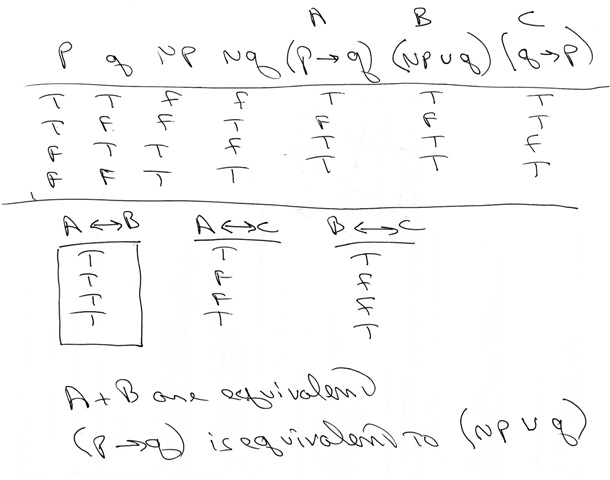ii)either the dog does not wag its tail or the dog is not calm
iii) if the dog is not calm, then the dog wags its tail.
p = the dog wags its tail.
q = the dog is not calm.
~p = the dog does not wag its tail.
~q = the dog is calm.
statement 1 translates to p -> q
statement 2 translates to ~p v q
statement 3 translates to q -> p
statement 1 and 3 are not equivalent
we need to test with statement 2 to see if it's equivalent to either one of the other 2.
when in doubt, you need to do a truth table.
it tells you whether the statement are equivalent or not.
the truth table for these 3 statements is shown in the following picture.
in this table:
statement 1 becomes statement A.
statement 2 becomes statement B.
statement 3 becomes statement C.

The truth table says that (p -> q) is equivalent to (~q v p).
That means that statement 1 is equivalent to statement 2.
It would be difficult to see this without use of the truth table.
Logically, trying to make sense of it takes a little stretch.
I believe the answer lies in the law of disjunction.
The law of disjunction states:
if A or B is true, then:
If A is false, then B must be true.
If B is false, than A must be true.
we have 2 statements that we think are equivalent because the truth table test of equivalency says that they are.
The 2 statements are:
i)if the dog wags its tail, then the dog is not calm.
ii)either the dog does not wag its tail or the dog is not calm
the contra-positive of the first statement and the first statement are equivalent.
The first statement is:
if the dog wags its tail, then the dog is not calm.
The contra-positive to the first statement is:
if the dog is calm, then the dog does not wag its tail.
The second statement is:
either the dog does not wag its tail or the dog is not calm.
If we assume that the dog does not wag its tail is false, then the law of disjunction says that the dog is not calm must be true.
we can write this another way to say:
if the dog wags its tail, then the dog is not calm.
that looks very much like the first statement.
if we assume that the dog is not calm is false, then the dog does not wag its tail must be true by the same law of disjunction.
we can write this another way to say:
if the dog is calm, then the dog does not wag its tail.
that looks very much like the contra-positive to the first statement.
i'm satisfied that the truth table is telling the truth and that statements 1 and 2 are equivalent even though anybody would be hard pressed to determine that they are without using the rules of logic to confirm that.
the truth table test is the way to determine the equivalency of two statements.
that's called demorgan's law i believe.
here's some additional reading for you if i didn't send it to you earlier.
there are references in there as well so you can study to your heart's content if you so desire.
STATEMENT LAWS AND FALLACIES